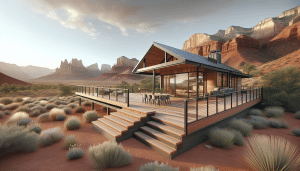When it comes to designing your dream deck, one of the most critical decisions you’ll face is choosing the right deck material. The choice between wood and composite decking can significantly impact your deck’s appearance, durability, and maintenance requirements. In this article, brought to you by Utah Deck Company, we’ll explore the pros and cons of both wood and composite decking materials to help you make an informed decision.
Contents
The Timeless Charm of Wood
Pros of Wood Decking
1. Natural Aesthetics
- Wood decks offer a warm, natural appearance that many homeowners find appealing.
2. Affordability
- Wood is often more budget-friendly than composite materials, making it an attractive option for cost-conscious homeowners.
3. Repairability
- Damaged wood can be repaired with relative ease by replacing individual boards.
4. Eco-Friendly Options
- Sustainable wood choices, like cedar and redwood, are available for environmentally conscious consumers.
Cons of Wood Decking
1. Maintenance Intensive
- Wood decks require regular staining, sealing, and maintenance to prevent weathering, rot, and insect damage.
2. Limited Lifespan
- Even with proper maintenance, wood decks tend to have a shorter lifespan compared to composite materials.
3. Prone to Warping and Cracking
- Wood decking can warp, crack, or splinter over time, leading to potential safety hazards.
The Modern Marvel of Composite Decking
Pros of Composite Decking
1. Low Maintenance
- Composite decks are virtually maintenance-free, requiring no staining or sealing.
2. Durability
- Composite materials are highly resistant to moisture, rot, and insects, resulting in a longer lifespan.
3. Variety of Styles
- Composite decking is available in a wide range of colors and textures, offering versatile design options.
4. Eco-Friendly
- Many composite boards are made from recycled materials, making them an eco-conscious choice.
Cons of Composite Decking
1. Higher Initial Cost
- Composite decking often comes with a higher upfront price tag than wood.
2. Less Natural Appearance
- While composite mimics the look of wood, some homeowners prefer the authenticity of natural wood.
3. Limited Repairability
- Damaged composite boards are more challenging to repair and may require replacing larger sections.
Making the Right Choice for Your Dream Deck
Choosing between wood and composite decking ultimately depends on your preferences, budget, and long-term goals. Here are some factors to consider:
- Budget: If you have budget constraints and are willing to invest more time in maintenance, wood may be the right choice. Composite decking offers long-term savings on maintenance costs.
- Aesthetics: Do you prefer the classic look of wood or the modern appearance of composite? Consider your home’s architectural style and personal preferences.
- Maintenance: How much time and effort are you willing to devote to deck maintenance? If you want a low-maintenance option, composite is ideal.
- Environmental Impact: If sustainability is a concern, look for certified sustainably sourced wood or choose composite decking made from recycled materials.
- Lifespan: Composite decking typically has a longer lifespan and may be a better investment if you plan to stay in your home for years to come.
At Utah Deck Company, we’re here to assist you in making the right choice for your dream deck. Whether you opt for the classic charm of wood or the modern durability of composite, our experts will ensure your deck is expertly designed and built to last.
Ready to discuss your deck project? Contact us today at (801) 921-6826 or visit Utah Deck Company for a personalized consultation. We look forward to helping you create the outdoor space of your dreams.





